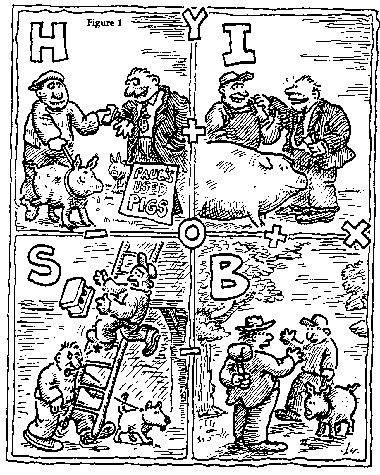![[Home]](http://meatballwiki.org/meatball.gif) LawsOfStupidity
LawsOfStupidity
MeatballWiki | RecentChanges | Random Page | Indices | Categories-

- illustration by James Donnelly
- Intelligent
- A person who through their own actions helps themselves and others
- Helpless
- A person who through their own actions hurts themselves but helps others
- Bandit
- A person who through their own actions hurts others in order to help themselves
- Stupid
- A person who through their own actions hurts others and also hurts themselves
Economist Carlo M. Cipolla outlines a sardonic analysis of human behaviour where he categorized humanity broadly into 4 categories (and further subdivisions) based on two axes:
- Do you help or harm yourself
- Do you help or harm others
His argument is that society underestimates the number of people who harm it out of stupidity and the extend of damage they can do because it is impossible for reasonable people to understand the unreasonable people, and thus no one is prepared.
The laws
- Always and inevitably everyone underestimates the number of stupid individuals in circulation.
- The probability that a certain person be stupid is independent of any other characteristic of that person.
- A stupid person is a person who causes losses to another person or to a group of persons while himself deriving no gain and even possibly incurring losses.
- Non-stupid people always underestimate the damaging power of stupid individuals. In particular non-stupid people constantly forget that at all times and places and under any circumstances to deal and/or associate with stupid people always turns out to be a costly mistake.
- A stupid person is the most dangerous type of person.
- A stupid person is more dangerous than a bandit.
See http://harmful.cat-v.org/people/basic-laws-of-human-stupidity/
Impact on community development
Let's admit this is a pretty cynical essay. Even the word "Bandit" has a moral judgment. There are plenty of industries that take more than they give back, and while generally useless for society, they may have admirable goals. For instance, the vast number of failed startups destroy money without meaning to fail. Or the goat herders in the story of TheTragedyOfTheCommons that graze on common grassland for themselves before others can destroy it is perfectly rational but not necessarily malevolent. That is a failure of a coordinating power to orchestrate a SuperordinateGoal .
However, the essay helps visualize what is hard to admit: a vast number of people will cause damage for absolutely no objective benefit to themselves or others.
Some proportion do believe it is beneficial to them and some are completely oblivious and some know it is entirely destructive, but they do it anyway.
What about intelligent people?
Regardless this model also suggests that fostering those who not only help themselves but also others is critical to the advancement of society because otherwise at best society stagnates, or more probably degrades.
So any SocialContract must quickly empower those making contributions and simultaneously preserve and protect those contributions from bandits and stupid people.
The principle of SoftSecurity to quickly allow anyone who can make a contribution to do so, but identify and control bad actors is an example. Letting anyone edit and contribute to a wiki is the obvious example here.
A HardSecurity principle would be to protect what is valuable to prevent any harmful actions from external parties. Put up a fence and defend your territory from the barbarians, in other words.